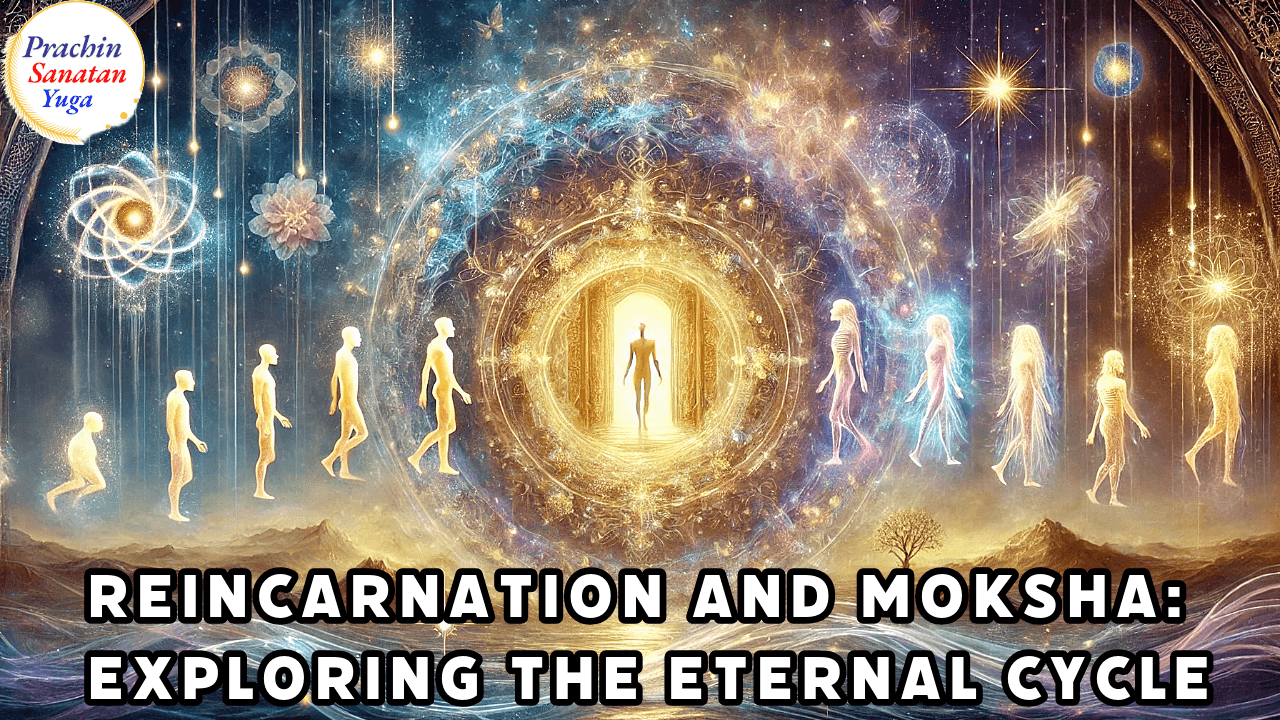
Reincarnation and Moksha: Exploring the Eternal Cycle
Central concepts in Sanatan Dharma, offering profound insights into the nature of existence, life, and the ultimate goal of the soul, are reincarnation and moksha. These ideas have been explored for millennia in Hindu philosophy and are deeply rooted in the scriptures, including the Vedas, Upanishads, and the Bhagavad Gita.
“Understanding Reincarnation: The Cycle of Life and Death”
In the belief of Reincarnation, or punarjanma, individuals believe that the soul, or atman, is eternal and goes through a continuous cycle of birth, death, and rebirth. According to Sanatan Dharma, the law of karma governs this cycle — the principle that every action has consequences.
This belief system holds that one’s actions in previous lives determine the circumstances of their current life and that one’s actions in this life will impact their future lives. This ongoing cycle of birth, death, and rebirth is seen as a way for individuals to learn and evolve spiritually, ultimately leading towards enlightenment and liberation from the cycle of reincarnation.
A new physical body is taken on by the soul based on the deeds (karma) performed in previous lives. This journey is not random; it is meticulously aligned with the individual’s accumulated karmic balance. Favorable circumstances in the next life are led to by good deeds, while challenges are resulted from harmful actions.
The Bhagavad Gita (Chapter 2, Verse 22) beautifully explains this process:
“Just as a person discards old clothes and wears new ones, so does the soul discard worn-out bodies and take on new ones.”
Table of Contents
“Moksha: Liberation from the Cycle”
The soul’s journey is explained by reincarnation, while its ultimate destination is represented by moksha. Moksha, the liberation from the cycle of birth and death, is marked by the end of worldly suffering and the union of the soul with the Supreme Consciousness, or Brahman.
The highest goal of human existence is considered to be achieved when moksha is attained. It is believed to be a state of eternal bliss (ananda) and self-realization, where the illusions of the material world (maya) are transcended by the soul. According to the Chandogya Upanishad (8.7.1), it is stated that “When all desires clinging to the heart fall away, the mortal becomes immortal and attains Brahman.”
“The Journey Toward Moksha”
The deeply personal and spiritual journey to moksha is identified by Hindu philosophy as having four key paths (margas) to achieve liberation :
- “Karma Yoga” – The path of selfless action, where duties are performed without attachment to the results, is followed. This guiding principle of performing actions selflessly is adhered to by individuals seeking spiritual growth and enlightenment.
- “Bhakti Yoga” – The soul is purified by the path of devotion, where unconditional love for the Divine is demonstrated.
- “Jnana Yoga” – The path of knowledge, where one seeks self-realization through wisdom and contemplation.
- “Raja Yoga” – The spiritual awakening is led to by disciplined practices in the path of meditation.
The emphasis in the Bhagavad Gita is placed on the fact that moksha can be attained through any of these paths when pursued with sincerity. This highlights the importance of sincerity in the pursuit of spiritual liberation.
“The Eternal Cycle and its Significance”
The interplay of reincarnation and moksha underscores the spiritual purpose of human life. Every experience, joy, and challenge is an opportunity for growth and learning. Reincarnation allows the soul to evolve, while moksha provides the ultimate release.
Far from being a fatalistic doctrine, individuals are empowered by this philosophy to shape their destiny. Progress toward liberation can be achieved by consciously performing good deeds, cultivating virtues, and seeking higher knowledge.
In general, it can be said that,
The profound spiritual wisdom of Sanatan Dharma is reflected in reincarnation and moksha, offering hope, purpose, and a sense of continuity. It is reminded by them that life is not merely about material pursuits but a sacred journey toward self-realization and unity with the Divine.
These concepts, in their understanding, encourage us to live a life of integrity, compassion, and awareness, steadily moving closer to being freed from the eternal cycle and attaining ultimate freedom.
